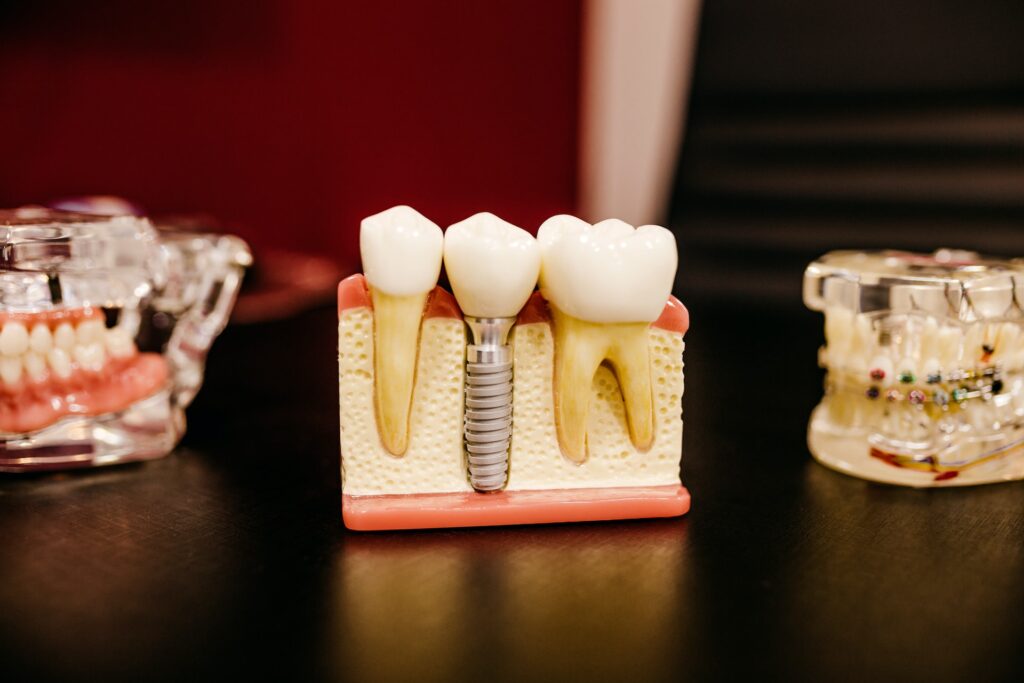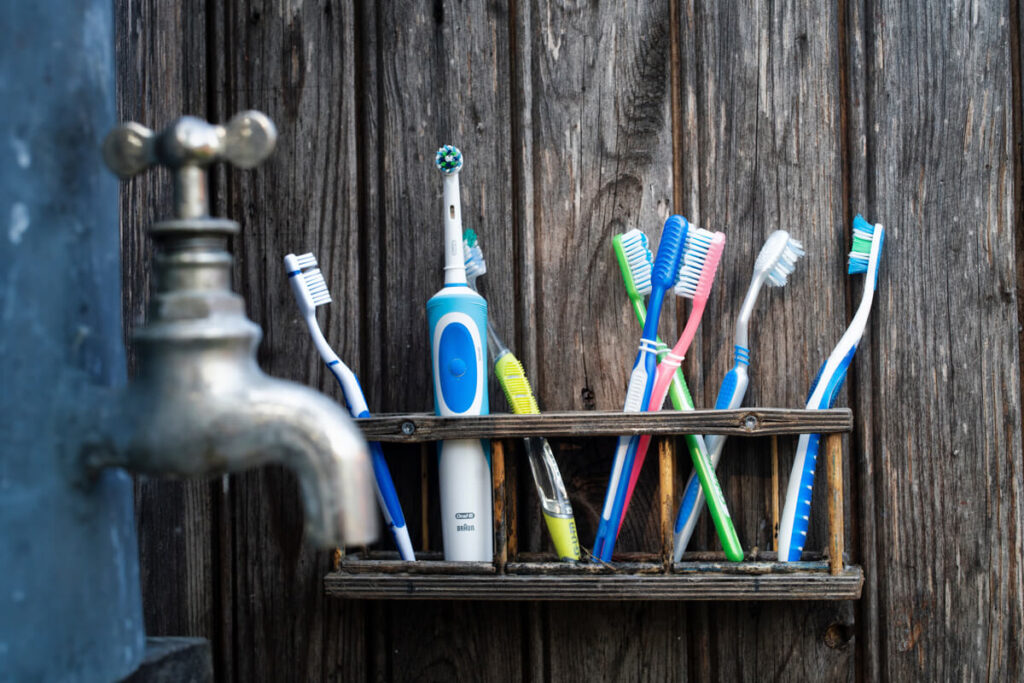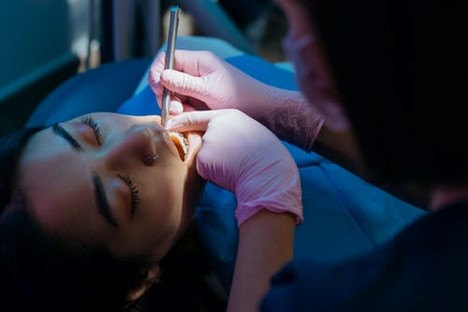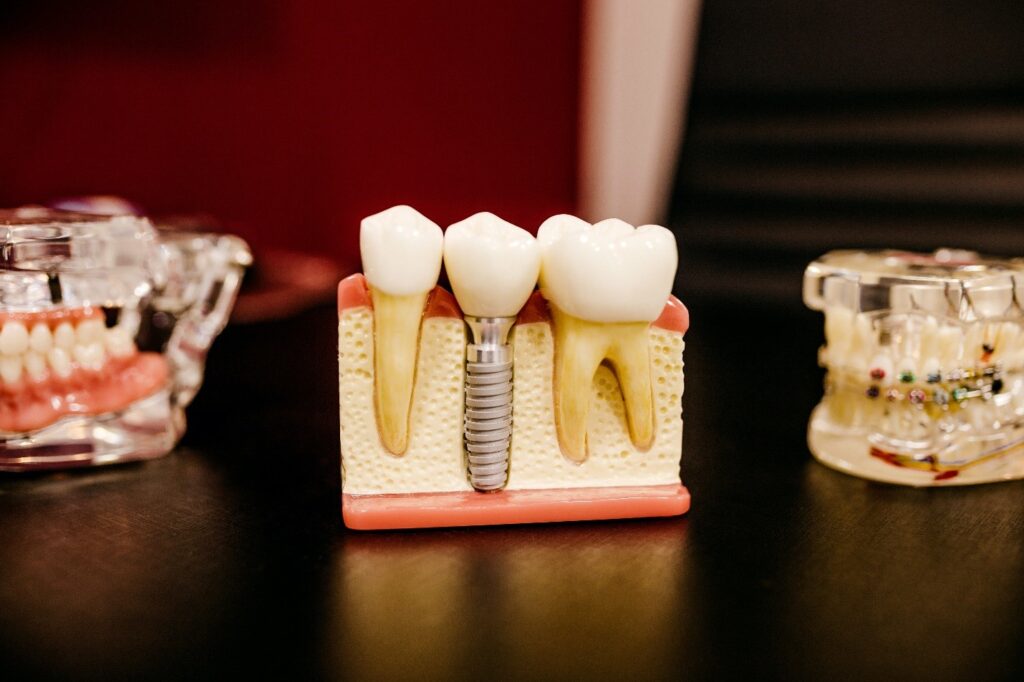Every tooth’s root has a small opening known as a canal that is filled with nerve fibers and blood vessels that provide nutrition to our teeth. These blood vessels and nerves are crucial to the health of your teeth; if they become infected, they may start to hurt significantly.
If your teeth get infected, you may need a root canal to disinfect the painful, infected area, prevent reinfection, and preserve your tooth to avoid having to replace it. When performing the procedure, your dentist will extract the inflamed or infected pulp — the material in the root of your tooth that contains the nerves, connective tissue, and blood vessels. They will then carefully clean the area, fill it, and seal the inside of the tooth to prevent reinfection.
The School of Dental Medicine estimates that more than 15 million root canal procedures are carried out annually. Every day, more than 41,000 root canals are performed — they are very common. The good news is that the treatment’s efficacy has a solid track record. Given how frequent dental root canal procedures are, you have probably heard of them. To better assist you in understanding root canals, this article offers information on when this procedure is necessary.
What Leads to the Need for a Root Canal?
A root canal procedure is needed when a tooth exhibits symptoms of infection or significant pulpal nerve damage. Bacteria can get into the pulp when a tooth is broken or has a large cavity. If this situation is not addressed, it may result in a serious infection, bone loss, or even the loss of the tooth.
To give you a clearer picture, here are the most frequent factors that lead to pulpal nerve damage and require root canal treatment:
- Tooth decay
- Fractured tooth
- Leaky fillings
- Trauma to the tooth that leads to nerve damage
Pulpal Damage Symptoms That May Require a Root Canal
Here are the following signs and symptoms of a pulp infection that may need a root canal:
- Pain when chewing or biting
- A loose tooth
- Teeth that are too sensitive to cold or hot beverages
- Facial, jaw, or cheek swelling
- Gum tenderness and swelling
- Tooth discoloration or tooth graying or darker color
- There’s a flow of pus or fluid from the tooth
When To See Your Dentist
It is extremely important to go to the dentist if you have tooth pain. The pulp in your tooth cannot recover on its own if it is infected. A tooth infection that is left untreated could get worse. This kind of infection, if untreated, can result in tooth abscess, pulp death, bone loss, tooth loss, and extreme pain.
Your dentist in Maryland will recommend a root canal if you experience ongoing tooth pain or swelling in the mouth or gums, especially if the pain or swelling is brought on by an infection deep inside the tooth.
Aside from checkups, ultrasounds, and lab tests, pregnant women should also make sure not to miss their regular dental appointments. After all, being pregnant increases your risk of oral health problems. Remember, it’s part of your overall wellness, so you should take extra care of your mouth, gums, and teeth during this time.
Don’t worry; routine dental visits are safe for most moms-to-be. The same goes for procedures like x-rays, tooth extractions, and fillings.
This article will discuss everything you need to know about keeping your teeth healthy and how it plays a crucial part in prenatal care.
Common Oral Health Problems During Pregnancy
Pregnant women typically have high progesterone levels, which encourage bacterial growth around the teeth and gums. For this reason, they become more prone to the conditions mentioned below.
-
Gingivitis: Approximately 60 to 75% of pregnant women have gingivitis, and untreated incidents may lead to periodontal disease. A periodontitis study shows that extreme forms of gum disease may cause premature labor and low-birth-weight infants.
-
Cavities: Being an expectant mother makes you more prone to cavities — permanently damaged areas in teeth holes. You can pass the cavity-causing bacteria to your baby during this time and even after you give birth.
-
Loose teeth: High estrogen levels during pregnancy can make teeth loose. In extreme cases, the teeth can fall off without professional dental care.
Dental Health Care Tips for Pregnant Women
Being pregnant is a sensitive time for moms and babies alike, so we recommend taking extra precautions with your dental health care during this time. Below are some dentist-approved tips to keep your oral health in excellent shape during pregnancy.
-
Brush your teeth for two minutes at least twice a day — ideally once in the morning and before you sleep — with fluoride toothpaste.
-
Floss between your teeth after your nightly brush.
-
Rinse your mouth with antimicrobial rinse at night after brushing and flossing.
-
Choose American Dental Association (ADA)-approved products for your teeth.
-
Observe a healthy diet with minimal sugar intake.
-
If you have morning sickness, mix some baking soda into a cup of water and rinse your mouth with it. This process stops stomach acid from attacking your teeth.
-
Don’t skip your bi-annual dentist appointment.
Visit a Reliable Bowie, MD Dentist Today
The spike in your hormones as you’re pregnant makes you more prone to particular dental health problems like gingivitis, cavities, and loose teeth. The best way to fight these conditions is to observe the best oral care practices and consult your dentist on your regular bi-monthly visit.
Remember, you need to maintain your overall health during this time, which includes your mouth, teeth, and gums. Ignoring it can lead to catastrophic consequences for your body and may even affect your child.
If you’re looking for a trusted Bowie, MD dentist to guide you on your oral health journey as an expectant mom, book an appointment with Abiodun Adesanya, D.D.S., P.C. now via (301) 464 1800.
The new year has come all too soon, but it’s not too late to create new year’s resolutions for healthier teeth and gums, and to improve your dental health. Here, we break down the best routines from Dr. Abiodun Adesanya, My Bowie Dentist, the leading family dentist in Bowie, MD, to get the pearly whites you’ve always wanted. Start this year right with the following methods to improve your dental health.
Always Brush Twice a Day
When it comes to proper oral hygiene, the number you need to remember is two. This applies to how many times you need to brush each day, and it all boils down to research. A 2016 review of 33 different articles published in the Journal of Dental Research confirmed that brushing less than two times a day may lead to more tooth decay compared to brushing at least twice a day.
Take 2 Minutes When Brushing Your Teeth
Again, the magical number two applies here. Studies show that taking two full minutes while brushing your teeth can boost your oral health. Because tooth decay occurs when plaque builds up, these bacteria can produce acid that eats through your teeth’s enamel, while damaging your gums and may lead to gingivitis. Brushing for two minutes can lead to a 41% reduction in plaque, which is almost twice as much as those who only brush for one minute.
Use Floss or Other Oral Care Aids
Dental experts stand by the health benefits behind flossing. Many believe that even when you brush your teeth at least twice a day, there are still areas that can’t be reached. In particular, the gum line between the teeth can build up plaque and food, which is why flossing to remove such debris can help prevent cavities and gum disease. Flossing is especially beneficial to people with type 2 diabetes since they are 3 times more likely to get gingivitis.
Develop Your Routine
Once you get started and figure out what needs to be done along with proper timing, it becomes a part of your routine, much like eating breakfast and getting ready for work. According to experts, most tooth decay can be prevented, and maintaining a healthy mouth is a great way to protect yourself from other medical problems. There are countless benefits to having proper oral hygiene, and it’s never too late to get started on making one.
Cut Down on Sugary Drinks
While it may not seem like it, what you drink has a huge impact on your oral health. When we drink sugary liquids, our teeth essentially bathe in that beverage and as a result, they can pose risks for our dental health. Be wary of fruit juices, as they contain a high amount of sugar while also being acidic. As such, these can promote the growth of bacteria in the mouth and may increase the chance of decay and cause damage to the tooth enamel.
Visit My Bowie Dentist Today
If you’re looking for a transformation in your dental health, be sure to follow the suggestions above. New year, new oral hygiene routine. We believe in you. You can even go one step further by sending us a message via our website, or by calling to schedule an appointment with Dr. Abiodun Adesanya and his awesome team to start your journey towards a healthier smile.
The holidays are just around the corner, and you’re probably already making a list of gifts to buy. Choosing gifts can be tricky, however, especially when you don’t know much about the person. If you’re having trouble, might we suggest some tooth-friendly holiday gifts? Below are seven lovely tooth-friendly holiday gifts we’re sure whoever receives will appreciate!
1. Sugar-Free Sweets
Sweets will always be part of the holidays, but you can prevent all the damage sugar can cause by opting for sugar-free sweets. You can get sugar-free gums, chocolates, caramels, lollipops, candies, and more. They are great stocking stuffers. Tasty, but will make sure you still have healthy teeth.
2. Floss Picks
Does anyone in your family hate flossing? In that case, we think floss picks are the perfect gift to stuff in their stockings. Floss picks are much easier to use than string floss, so there’s a good chance they will like it. These picks are also the perfect gift to encourage someone you know who just doesn’t like to floss.
3. Electric Toothbrush
Electric toothbrushes are a gem of a gift. They’re much better at cleaning the teeth than manual brushing, so we’re confident whoever receives your gift will love it. For kids, you can choose the ones with cartoon characters or fun colors. These electric toothbrushes come in numerous designs, so you can find one that suits whoever you plan to give it to.
4. Whitening Kit
Teeth whitening is a trendy dental cosmetic procedure in the US. Lots of people want to get their teeth whitened so that they can have a truly bright smile. With that said, a whitening kit could be the perfect gift to give someone you think would love to get this procedure. Thanks to your gift, they can still get the white teeth they want, only at home.
5. Mouth Guard
This tooth-friendly gift is for someone who plays sports. What could be the perfect present for them? How about a mouthguard? It’s a thoughtful gift that can reduce the possibility of athletes sustaining sports-related dental injuries. With a mouth guard, your sporty-friend can enjoy their passion and hobby without worry,
6. Toothbrush Sanitizer
Toothbrushes help clean all the nasty things still in your mouth and on your teeth. What about all the bacteria left on the toothbrush itself? A toothbrush sanitizer can help with that. Whoever receives your gift will appreciate that they can prevent bacteria and debris left on the toothbrush from traveling back into their mouth.
7. Travel Toothpaste Container
For your friend who likes to travel, we suggest getting a small, travel-size toothpaste container. This way, there is no need for them to lug around their big toothpaste when going on a trip. They can simply squeeze some toothpaste into the travel container, put it in a clear ziplock with some floss picks, and they’re good to go.
Conclusion
There’s no need to rack your brain for gifts this holiday season. Why not try any of the above tooth-friendly gifts on this list and see how your loved ones light up with a healthy smile on their faces? Besides gifts that promote good dental health, don’t forget to get regular dental checkups and let Dr. Adesanya keep your teeth looking great!
Holiday stress can cause some issues with our oral health. What do bruxism (teeth clenching) and shopping surges have in common? First, they are common during the holidays. And, both may very well be the products of stress — during the holidays and out of it.
Whether it is the Fourth of July or Christmas, holidays bear more than gifts and celebrations. All the shopping, meal preparation, and dealing with relatives can get on the nerves. As a result, holiday celebrations can turn into holiday stress that can affect oral health.
The effects the holidays can have on oral health range from teeth clenching to irritating sores. Find out more about what can happen to your teeth and mouth when merry-making takes a stressful turn.
Bruxism
One of the most common signs of a stress response is bruxism. In common day terms, bruxism is the gnashing and grinding of teeth. It occurs during certain phases of deep sleep. To some, grinding the teeth is a way to diffuse feelings of frustration and anxiety.
As a stress response, bruxism is often done subconsciously. While it is not the most life-threatening of habits, it can cost you your teeth. The friction from teeth clenching can damage the tooth enamel, the outermost layer of the teeth.
Once the tooth enamel has been worn down, cavities can develop. At its worst, bruxism can also damage the gumline, causing teeth to either break or loosen.
Drying of the Mouth
During stress, breathing shifts from the nose to the mouth. When a person breathes through the mouth long enough, the mouth can dry up. The reason for this is that the oxygen inhaled is a dry gas. The passage of oxygen along mucous membranes (like the mouth) can cause the usually moist structures to dry.
A dry mouth can be a breeding ground for bacteria that cause halitosis (bad breath). Also, without moisture and lubrication from saliva, the mouth can develop cracks and sores. Tooth decay can also result from the absence of saliva.
Buccal Sores
Stress can cause erratic chewing patterns. This is brought about by the mandibular tension that stress can cause. At times, the movement of the jaw can cause the teeth to rub too close to the buccal mucosa or cheek. When this happens, sores on the cheeks — or canker sores — form.
Benign yet uncomfortable, canker sores can worsen if left untreated.
Temporomandibular Disorder
Chronic tension on the jawline caused by stress can lead to TMD or temporomandibular disorder. The disorder causes jaw and temporal headaches and can also affect the health of teeth.
This condition will require a visit to the dentist. Left untreated, TMD can cause long-lasting and often irreparable damage to the molars.
Protect Your Teeth from the Effects of Holiday Stress
Stress can affect your teeth and how you enjoy the holiday season. However, at times, stressful events happen unavoidably, costing you your holiday experience and teeth.
Have the milk, cookies, eggnog, and teeth-gnashing taken their toll on your teeth? Schedule an appointment with Dr. Adesanya now and give your teeth something to celebrate about.
Halloween is right around the corner! Do you have your costume ready? Have you figured out what you want to be and how it relates to your skin tone? Did you know that this is also a perfect time to think about your oral health, and Halloween isn’t just about giving candy to little children in costumes but thinking of how your teeth will look when you take off your mask?
It is essential to go for a check-up at least once every six months so that the dentist can examine your teeth and gums. This way, any problems can be fixed early on rather than waiting until there is an emergency. Plaque can contribute to gum disease and cause tooth decay. It contains bacteria that clings to the surface of your teeth. It causes cavities, bad breath, and tooth decay, but you can brush twice a day with fluoride toothpaste to prevent this buildup.
Tips and Tricks For a Healthy Halloween
Avoid Sugary Foods and Drinks
Sugary foods and drinks can lead to tooth decay, cavities, discoloration of your teeth due to the caramelized sugars found in candy corns, candies, baked goods, and other sugary foods. These foods also contain acids that waste away at your enamel, leaving grooves prone to trapping food particles that cause bacteria to form and create plaque buildup.
Drink Plenty of Water To Stay Hydrated
If you’re spending a lot of time in the sun or out in colder weather, stay hydrated by drinking lots of water throughout the day. Since this is a holiday where there are a lot of treats and snacks from your neighbors, it’s essential to keep your oral health in check by brushing your teeth after every meal just as you would on any other day.
Brush Your Teeth at Least Twice a Day
If you know you’ll be spending the night at a Halloween party, put your toothbrush in your purse or pocket so that you can brush after every meal.
Eat Fruits Instead
If you don’t have time to brush after supper, eat fruits with peels or skins. This is because the skin is tough to remove, and even if you do, there is still plenty of value in eating an apple. Water also helps wash away food particles that could promote cavities or plaque formation.
Rinse Your Mouth Out With Water After Eating Hard Candies
Hard candies or chewing gum could lead to cavities or tooth decay due to being chewed for a prolonged period. Be sure to rinse your mouth with water after eating any candy that contains sugar-based ingredients like sorbitol, xylitol, maltitol, fructose, dextrose, or mannitol which can be found in some gums, sweets, chocolates, baked goods, and frozen desserts.
A healthy mouth is one of the keys to health, so you must take some time to focus on your oral care during Halloween. The steps we’ve listed above can help ensure a happy and healthy Halloween for everyone in your family!
Visit My Bowie Dentist today to check on your dental health, or contact us for more information.
How does a Manual vs Electric Toothbrush compare? Your toothbrush plays a vital role in your oral health. Using the right toothbrush can effectively remove plaque and bacteria that can cause gum disease and tooth decay. Brushing your teeth regularly can also keep your breath fresh and your teeth free from stains.
But since toothbrushes come in different types today, do you know which to use? Do you know the difference between a manual and an electric toothbrush and which one better suits your needs?
If you’re planning to switch to a new toothbrush, read this article first. This will discuss the pros and cons of a manual and electric toothbrush, so you’ll know which one to buy next.
Manual Toothbrush
Although manual toothbrushes have been around for decades, they’re still an effective tool for cleaning your teeth and preventing countless oral diseases. Manual toothbrushes come in a wide variety of shapes, sizes, colors, and designs today.
Pros
- Accessible: As the most traditional type of toothbrush, you can expect that manual toothbrushes are available everywhere. You can purchase these in any grocery store, dollar store, pharmacy, or even gas station.
- Affordable: Manual toothbrushes are affordable; you can buy one for $1 or $3.
- Easy to use: Manual toothbrushes don’t come with switches or controls, making them very easy to use.
Cons
- May hurt the gums and teeth: Since there’s no built-in mechanism to determine how long you’re brushing your teeth or if you’re brushing too hard, manual toothbrushes can hurt your teeth and gums.
Electric Toothbrush
Generally, electric toothbrushes have bristles that rotate or vibrate to easily remove plaque build-up from your gums and teeth. The vibration of electric toothbrushes creates micro-movements, making it easier for you to clean your mouth.
Pros
- More effective in removing plaque: Studies show that electric toothbrushes are more effective in removing plaque and preventing gingivitis than manual toothbrushes. After three months of using an electric toothbrush, plaques were reduced to 21% and gingivitis by 11%.
- Suitable for people with limited mobility: Because electric toothbrushes will do most of the work for you, this kind of toothbrush is apt for individuals with limited mobility, like those with carpal tunnel, arthritis, and developmental disabilities.
- Fun for kids: Electric toothbrushes make brushing more fun for kids. Introducing this early to your kids can easily set healthy habits and encourage them to maintain good oral health.
Cons
- Expensive: One of the biggest drawbacks of electric toothbrushes is their price. Unlike manual toothbrushes, you’ll need to spend at least $15 to own an electric toothbrush. The more features the electric toothbrush has, the more expensive it can get.
Seek Professional Guidance
While comparing a Manual vs Electric Toothbrush, it’s also best to ask for advice from a medical professional. If you live in Bowie, for example, take the time to consult a dentist in Bowie, MD, to ensure that you end up using the right kind of toothbrush.
If you’re still trying to figure out which toothbrush to get, contact us at (phone number) or email us through dradesanyadds@gmail.com . Here at Dr. A’s, we provide oral health services to the residents around Bowie, MD, and we’re ready to help you choose the perfect toothbrush!
What Is a Dental Bridge?
Dental bridges cover the gap created between two or more teeth. On each side of the gap, the bridge is supported by other real teeth. The space in between is filled by a false tooth called a pontic. It is made of gold, porcelain, alloy or a mix of these. If you are looking for a dentist in Bowie, MD for a dental bridge, read on.
Benefits of Dental Bridges
1- Maintain the shape of your face
2- Restore your smile
3- Ensure you can speak and chew without difficulty
4- Prevent force on specific teeth by distributing force equally
5- Prevent remaining teeth from repositioning
Types of Dental Bridges
There are four different kinds of dental bridges you can opt for:
1- Fixed bridge
2- Cantilever bridge
3- Maryland Bonded bridge
4- Implant-supported bridge
1- What Is a Fixed Bridge?
A fixed bridge, also known as a traditional bridge, is quite common and is generally made using ceramics or metal and porcelain.
A filler tooth is created that is supported by crowns located on top of healthy teeth on each gap’s side, so the bridge stays in place. This kind of bridge can only be used when there are healthy teeth on each side of the gap to support the bridge.
2- What Is a Cantilever Bridge?
If there are no teeth on one side of the gap to support the bridge, the cantilever bridge is recommended. A crown is fixed on the side with the healthy tooth, and that supports the bridge.
3- What Is a Maryland Bonded Bridge?
Also known as a resin-bonded bridge, a Maryland bonded bridge is usually the go-to when replacing front teeth.
4- What Is an Implant-Supported Bridge?
In an implant-supported bridge, dental implants are used instead of crowns or other frameworks. For every missing tooth, an implant is placed, and this supports the bridge. An implant-supported bridge is considered the strongest and most stable. It is executed through two surgeries:
- The implants are embedded in the jawbone.
- The bridge is placed.
A metal framework is used for them, and porcelain is fused to the metal teeth. Metal or porcelain wings are then utilized on both sides of the bridge to attach the pontic to the healthy teeth.
This is often employed as an alternative to the traditional fixed bridge because you do not need to reshape or add a crown to the healthy teeth on either side. Instead, metal wings are used.
How Much Does a Dental Bridge Cost?
The cost for a dental bridge varies based on the type of bridge you opt for and the cost of the dental crown. Depending on your dental plan, dental insurance would pay a percentage of it. To discuss your case further, you can contact your dentist in Bowie, MD, My Bowie Dentist.
Do Dental Bridges Last a Long Time?
It is important to take care of oral hygiene and get frequent checkups. If you do so, your dental bridges can easily last 10-15 years.
Eating With a Dental Bridge
A dental bridge should make chewing and, ultimately, eating much easier for you. It could take a while before you get accustomed to the bridge. Until then, you can consume liquids and soft foods.
Speaking With a Dental Bridge
It is often harder to speak and comprehend due to missing teeth. A dental bridge will make speaking much easier for you.
Do You Need Dental Bridges?
Dental bridges are always a practical alternative to dental implants. Your dental treatment should be customized based on your requirements. Consult Dr. Abiodun Adesanya at My Bowie Dentist to discuss what type of bridge is suitable for you.
Getting dental insurance and having dental work done is vital to having healthy teeth. However, it is also something that we often overlook. Oral health is as important as your body’s health. Getting routine check-ups and frequent visits are something that every individual should add to their daily life.
The good thing is that there exists insurance that can help you with maintaining your dental hygiene. Dental insurance has been quite in demand for the past few years, as more people are growing aware of the importance of dental health and routine procedures vital to ensure strong teeth.
Dental Insurance
It’s okay if you’re hearing this term for the first time. That why we’re here – to take you through what it is. Dental insurance, like any other insurance, is a method of paying for your oral procedures. From root canals to crown fillings to tooth extraction – dental insurance may cover it all. All you have to do is go to an insurance firm that offers dental insurance and pay for a particular insurance package that best caters to you.
Dental insurance packages, however, vary greatly. Not every package will be the same, and each package will cover only a certain amount of monetary sum. There will be packages that will pay 25% of your procedure, some 50%, and some might pay all the way. However, that specific package may cost you a bit to purchase.
Types of Dental Insurance
Let’s explore some of the dental insurance types, shall we?
Preferred Provider Organization (PPO)
PPO has a list of dentists who are in partnership with them and visiting those particular dentists can save you quite a good sum of money. However, if a dentist is not on the PPO, you may have to pay more from your own pocket.
Dental Health Maintenance Organization (DHMO)
Plans like DHMO also have a list containing a bunch of dentists who work with them for a specific fee. But to avail the benefits that come with DHMO, you’ll have to stick to one of the dentists from the list.
Discount Plan
This plan also has a few dentists signed with them. However, they only provide you with a certain discount and nothing more regarding patient care.
How Does Dental Insurance Work
When you visit a dentist, your dental insurance will be verified first to estimate the sum of money you will have to pay. After that, a payment request will be sent to the insurance company, more commonly called a “claim.” After the request has been processed, the insurance company will evaluate and process the claim, not before finally letting you know about your explanation of benefits or EoB. The exact money you’ll have to pay will heavily depend on the procedure you’re getting.
Some of the specifics of your plan will include the following:
Deductibles
The amount you pay to your insurance company before purchasing a package.
Coinsurance
After purchasing your insurance package, you might be required to pay a certain percentage of the treatment.
Co-Pay
This is the fixed cost that you are required to pay.
Annual Maximum
The amount your insurance company will pay in a year. The company won’t pay any more if you reach this limit.
Preauthorization
Your request will have to be approved and authorized by the insurance company for you to start availing the benefits they provide.
You probably know that getting a cavity treated immediately is imperative if you’re trying to maintain perfect oral health. That said, what will happen if a cavity is left untreated? Even if your tooth isn’t hurting in a specific scenario, should you still get it checked by a professional like My Bowie Dentist?
There are several good reasons why your dentist tells you to not ignore cavities. Here are some of them.
Increased Sensitivity
The initial signs of a cavity can cause your tooth or teeth to become more sensitive to cold and hot temperatures. You’ll notice that you won’t be able to enjoy to your hot cup of coffee in the morning or you may get a toothache when you’re drinking a cold refreshing glass of lemonade in the summers. This is just your body’s way of telling you that there’s a problem in your tooth you need to address immediately.
A Deteriorating Health
Another thing that can happen if you leave a cavity untreated is that you can get a tooth infection because of the severe decay. This can also cause a serious illness! When you leave the infection in your mouth untreated, the bacteria can then enter your blood stream, which gives it an easy route to spread to your whole body.
Not only are you going to start to feel sick, but you can also develop a life-threatening disease called sepsis. Because of this reason, it is imperative you get your tooth checked immediately!
You May Need A Root Canal
An untreated cavity is eventually going to reach your tooth’s pulp which will make the nerves under your tooth to become exposed. When this happens, you’re going to start feeling immense pain. Once a cavity’s decay reaches the bottom of a person’s tooth, a root canal becomes necessary. A person may also need a tooth extraction depending on how large the cavity is.
Swelling May Happen
Another thing that happens when bacteria reaches the bottom of your tooth is that it can start to become abscessed. This is when your gums start to swell and chewing stuff may become a problem. This is your body’s way of telling you that it’s time to see a dentist like My Bowie Dentist!
The Size Of Your Cavity Will Increase
The longer you wait to visit a dentist, the larger your cavity will grow. This will make your tooth become brittle and your tooth may also start to get hollow because of the bacteria eating your tooth. At one point, your tooth will crack!
Pain Will Increase
Over time, as the signs begin to get more apparent, the pain caused by the cavity will only increase and chewing something as soft as a marshmallow will become hard for you, too. Ignoring this for too long can cause irreparable damage!
Bowie Family Dentist
Pain and sensitivity are often the two most common signs that you need to get your tooth checked by a dentist. If you’re facing the same case, you should contact My Bowie Dentist by calling us on 1 301 464 1800 or you can click here to fill out our contact form.










